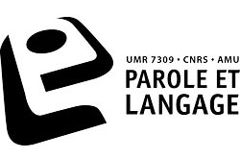At LPL, we study language as it used -- produced, perceived and interpreted -- in its environment. We are doing so within an empirical approach grounded on linguistic mesures and facts coming from corpora and experimental work. This work takes its roots in linguistic description and can be implemented in formal models.
Speech and spoken language, most notably prosody, were and remain the central research objects of the lab. The lab expertise rely in a sound scientific process starting from hypothesis formulation developping into data set creation, and testing the former on the later. This process cannot be initiated without solid linguistic knowledge acquired through linguistic description and field work. Formalisation is seen more as tool than as a goal.
Linguistic data are performances produced by language users and include the traces the environment imposes. Variations of all sorts are crucial in our studies, either in an attempt to neutralize them or to study them.
LPL benefited in the recent years of stronger interaction with cognitive and neuro-sciences. This direction allows to better anchor linguistic models in cognitive process architectures and their neural implementation. More globally, the lab considers broadly the fields interested in human language.
Currently, the lab continues to develop these directions toward the neural bases as well as the general trend of emphasizing the "data scientific" nature of our work. Moreover, we are developping collaborations with colleagues dealing with health or education domains as well as digital applications. Those are strong examples of virtuous circles between foundational research and application. Variations induced by these specific contexts are providing interesting paradigms for asking foundational questions on language. It is therefore in a natural way that research results are applied in these practical contexts.
Speech and spoken language, most notably prosody, were and remain the central research objects of the lab. The lab expertise rely in a sound scientific process starting from hypothesis formulation developping into data set creation, and testing the former on the later. This process cannot be initiated without solid linguistic knowledge acquired through linguistic description and field work. Formalisation is seen more as tool than as a goal.
Linguistic data are performances produced by language users and include the traces the environment imposes. Variations of all sorts are crucial in our studies, either in an attempt to neutralize them or to study them.
LPL benefited in the recent years of stronger interaction with cognitive and neuro-sciences. This direction allows to better anchor linguistic models in cognitive process architectures and their neural implementation. More globally, the lab considers broadly the fields interested in human language.
Currently, the lab continues to develop these directions toward the neural bases as well as the general trend of emphasizing the "data scientific" nature of our work. Moreover, we are developping collaborations with colleagues dealing with health or education domains as well as digital applications. Those are strong examples of virtuous circles between foundational research and application. Variations induced by these specific contexts are providing interesting paradigms for asking foundational questions on language. It is therefore in a natural way that research results are applied in these practical contexts.







